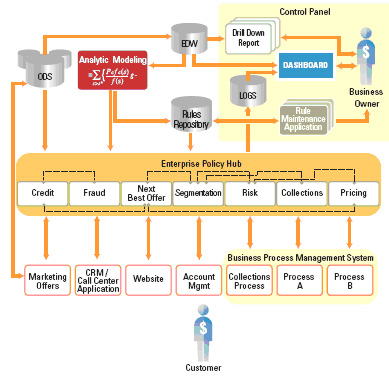There are two main ways to apply a business rules management system (BRMS). The first is to consider a business rules approach as a way to gain developer productivity, for initial development, but even more for subsequent maintenance. Such productivity gains have proven to be significant – up to 75 percent reduction in ongoing maintenance. The second way to apply a BRMS is to focus on decisioning as a new and emerging class of business problem, and on a BRMS as a platform for automating and improving critical operational decisions. This approach can produce a significant impact on revenue, loyalty, customer acquisition, customer retention and more. This is sometimes called an Enterprise Policy Hub.
According to IDC, “The policy hub is that point in a business process at which decisions are made and from which the results of the decision are communicated to the people and business transactional/operational systems that are affected.”1 An Enterprise Policy Hub is a platform that delivers decisions to operational systems and business processes. It centralizes an organization’s operating policies, procedures, regulations, models and expertise, delivering them to all systems throughout the extended enterprise. It is the place where any process or system goes to get operational decisions made.

An Enterprise Policy Hub, as illustrated in the figure above, delivers decisions to all applications and processes throughout an enterprise. An Enterprise Policy Hub has a number of key elements.
- A logical or physical service or set of services that have the responsibility for responding to requests for decisions regardless of request origin.
- The capability to manage and share rule-driven services so they can be reused and shared effectively.
- Direct, high performance access to operational data, perhaps including external sources for additional data required to make the appropriate decision.
- An enterprise rules repository that allows the management of rules in a collaborative fashion by the business and IT.
- Deployment infrastructure for analytic models and data mining to allow data-driven insight to be embedded in the decision.
- A control panel where the business can control the hub integrated with corporate performance management dashboards and other reports.
There are many potential benefits to an Enterprise Policy Hub. It separates business logic from operational systems. A business rules approach is typically used for high-value business rules from major applications, whereas an enterprise-wide approach will also manage smaller groups of rules in minor applications.
If an Enterprise Policy Hub is in place, many projects find it worthwhile to externalize, manage and leverage business rules, bringing the proven benefits of business rules to a higher percentage of the application portfolio. An Enterprise Policy Hub also provides consistency with agility. Modifications to business policies are made once and used across the entire enterprise. An Enterprise Policy Hub enables an organization to treat logic as a reusable enterprise resource to be managed and exploited. By focusing human resources on the five percent of a decision that cannot and perhaps should not be completely automated, the organization can better leverage the experience and intelligence of its staff.
An Enterprise Policy Hub also provides a platform for bringing analytic insight to operational decision-making. With a single place to go for a particular decision it is much easier to identify potential uses of information to improve decisions and bring business intelligence to bear on business processes2.
While there are huge benefits to be gained by implementing an Enterprise Policy Hub, most organizations want to generate a return on investment (ROI) at each stage of development. A staged approach might go something like this:
- Identify potential decision services and capture and engineer business rules. Focus on high-value decision services, the experts who understand them and the legacy systems that must be considered.
- Find opportunities to re-use rules. Some rules from first projects can often be re-used in other systems.
- Identify business services under development or in planning that are “decision-centric,” and automate them using the BRMS – evangelize the BRMS.
- Encourage business groups responsible for the rules to be accountable for the decisions themselves –not just the rules or logic.
- Leverage analytics to improve rules- use data mining to find better rules and enhance the information available to rules using predictive models.
Customers adopting a BRMS from an enterprise perspective and moving towards an Enterprise Policy Hub can bring more precision and consistency to their operational decisions while maintaining the critical business agility they need.
This article was excerpted from the Chapter “Implementing an Enterprise Policy Hub” in the new book, The Business Rules Revolution .
1 “Policy Hubs: Progress Toward Decision-Centric BI” by Henry Morris and Dan Vesset, IDC.
2 See Bringing Analytics into Process Using Business Rules at https://www.bpminstitute.org

















